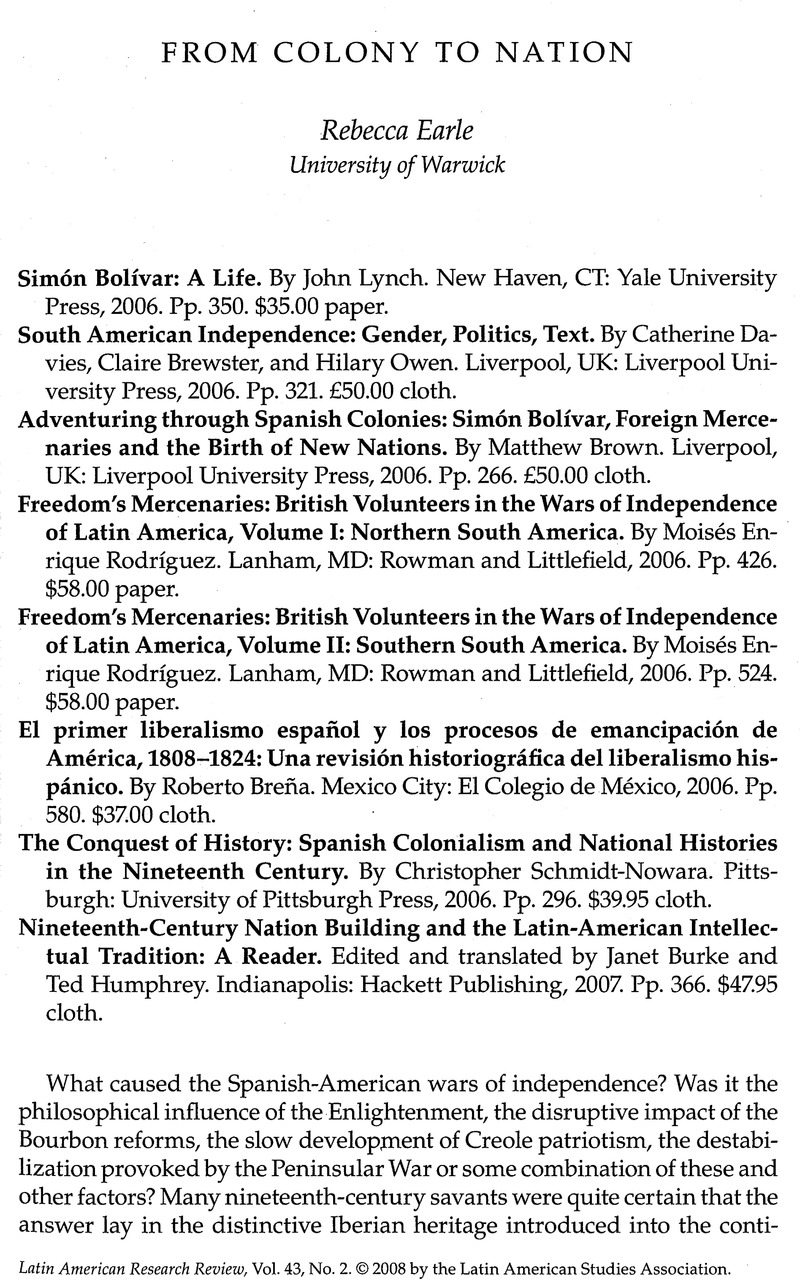No CrossRef data available.
Article contents
From Colony to Nation
Review products
Published online by Cambridge University Press: 05 September 2022
Abstract

- Type
- Review Essays
- Information
- Copyright
- Copyright © 2008 by the University of Texas Press
References
1. Bartolomé Mitre, Historia de San Martín y de la emancipación sud-americana (según nuevos documentos), 3 vols. (1859; Buenos Aires, 1887–1890), 1: 58–59, 87.
2. Justo Sierra, “España y América,” November 10, 1910, Obras completas, vol. 5: Discursos, ed. Manual Ghigliazza (Mexico City: Universidad Nacional Autónoma de México, 1984), 278.
3. Bartolomé Herrera, Sermón pronunciado... el dia 28 de julio de 1846 aniversario de la independencia del Perú (Lima, 1846), 15–16.
4. See, for example, Alfonso Múnera, El fracaso de la nación: Región, clase y raza en el Caribe colombiano (1717–1821) (Bogotá: Banco de la República/El Áncora, 1998); Eric van Young, The Other Rebellion: Popular Violence, Ideology, and the Mexican Struggle for Independence, 1810–1821 (Stanford, CA: Stanford University Press, 2001); Aline Helg, Liberty and Equality in Caribbean Colombia, 1770–1835 (Chapel Hill: University of North Carolina Press, 2004); Steiner Saether, Identidades e independencia en Santa Marta y Riohacha, 1750–1850 (Bogotá: Instituto Colombiano de Antropología e Historia, 2005); and Sarah Chambers, “Republican Friendship: Manuela Sáenz Writes Women into the Nation, 1835–1856,” Hispanic American Historical Review 81, no. 2 (2001): 225–258.
5. Jaime Rodríguez O., The Independence of Spanish America (Cambridge: Cambridge University Press, 1998).
6. For a different view of racial harmony, see Marixa Lasso, “Race War and Nation in Caribbean Gran Colombia, Cartagena, 1810–1832,” American Historical Review 111, no. 2 (2006): 336–361.
7. Sarah Chambers, From Subjects to Citizens: Honor, Gender and Politics in Arequipa, Peru, 1780–1854 (University Park: Pennsylvania State University Press, 1999).
8. See, in addition to From Subjects to Citizens, Christine Hunefeldt, Liberalism in the Bedroom: Quarrelling Spouses in Nineteenth-Century Lima (University Park: Pennsylvania State University Press, 2000); Tanja Christiansen, Disobedience, Slander, Seduction, and Assault: Women and Men in Cajamarca, Peru, 1862–1900 (Austin: University of Texas Press, 2004); and Arlene Díaz, Female Citizens, Patriarchs, and the Law in Venezuela, 1786–1904 (Lincoln: University of Nebraska Press, 2004).
9. For examinations of the relationship between gender and race in the United States, see, for example, Elizabeth Fox-Genovese, Within the Plantation Household: Black and White Women of the Old South (Chapel Hill: University of North Carolina Press, 1988); Victoria Bynum, Unruly Women: The Politics of Social and Sexual Control in the Old South (Chapel Hill: University of North Carolina Press, 1992); and Kathleen Brown, Good Wives, Nasty Wenches and Anxious Patriarchs: Gender, Race and Power in Colonial Virginia (Chapel Hill: University of North Carolina Press, 1996).
10. See, for example, François-Xavier Guerra, Modernidad e independencias: Ensayos sobre las revoluciones hispánicas (Madrid: Editorial MAPFRE, 1992); François-Xavier Guerra, Antonio Annino, and Luis Castro Leiva, eds., De los imperios a las naciones: Iberoamérica (Zaragoza, Spain: Ibercaja, 1994); François-Xavier Guerra, Mémoires en devenir: Amérique Latine. XVIe–XXe siècles (Bordeaux, France: Maison des Pays Ibériques, 1994); and François-Xavier Guerra and Antonio Annino, eds., Inventando la nación: Iberoamérica siglo XIX (Mexico City: Fondo de Cultura Económica, 2003).
11. See, for example, Nelda Pilia de Assunção and Aurora Ravina, eds., Mayo de 1810 entre la historia y la ficción discursivas (Buenos Aires: Editorial Biblos, 1999); Beatriz González-Stephan, Fundaciones: Canon, historia y cultural nacional: La historiografía literaria del liberalismo hispanoamericano del siglo XIX (Madrid: Iberoamericana, 2002); Mark Thurner and Andrés Guerrero, eds., After Spanish Rule: Postcolonial Predicaments of the Americas (Durham, NC: Duke University Press, 2003); and Sara Castro-Klarén and John Charles Chasteen, eds., Beyond Imagined Communities: Reading and Writing the Nation in Nineteenth-century Latin America (Washington, DC: Johns Hopkins University Press, 2003).
12. See John Lynch, The Spanish American Revolutions 1808–1826 (New York: Norton, 1986); and John Lynch, ed., Latin American Revolutions, 1808–1826: Old and New World Origins (Norman: University of Oklahoma Press, 1994).


